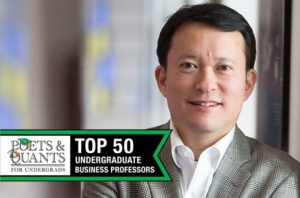John Kim
Lecturer
Emory University, Goizueta Business School
Organization and Management professor John Kim says he knew he wanted to be a business school professor once he realized his extensive experience as a management consultant was really an undercover way of teaching business. The consulting professional turned business professor now teaches strategic management, management consulting, and healthcare strategy to Goizueta Business School undergrads. He also oversees Goizueta’s Business Institute, a three-week business bootcamp for non-business majors. When he’s not teaching undergrads, Kim can be found blogging about the role of a management consultant and related topics including tips and tricks for interviewing clients and how to solve complex business problems. Kim’s blog, “Consultant’s Mind,” is consistently rated as one of the top leading management consulting blogs and websites to follow.
Age: 46
Education: Master of Business Administration, Goizueta Business School, 2005
At current institution since: 2017
List of courses you currently teach: Strategic Management, Management Consulting, Healthcare Strategy
Twitter handle: @ConsultantsMind
What professional achievement are you most proud of? Addressing 320+ seniors and their parents at the graduation celebration.
“I knew I wanted to be a business school professor when…” I realized that all my management consulting work – speaking with executives, coaching junior consultants – was a form of teaching business in disguise.
“One word that describes my first time teaching…” A.w.k.w.a.r.d.
What are you currently researching and what is the most significant discovery you’ve made from it? Healthcare strategy. The US healthcare system was developed on top of employer-sponsored insurance plans from the 1940’s and has become more Byzantine every year. It’s more than 15% of the economy, and by some measures, 1/3 of it is wasted resources and time. Strategy frameworks and consulting tools can help executives break down complexity, prioritize among conflicting trade-offs, and ultimately, build a sustainable competitive advantage.
What is your most memorable moment as a professor? A shy, unsure, and book-smart student finds her voice. Starts engaging in American-style classroom banter – able, eager to argue her point-of-view. Yes, strong opinions loosely held.
Since you first started teaching, how has business education changed? For me, the classroom has become more interactive – podcasts, exercises, videos, post-it notes, online discussions, and of course, cold-calls.
“If I weren’t a business school professor, I would be…” still on the road, as a management consultant – creating PowerPoint slides and collecting Marriott loyalty points.
“Here’s what I wish someone would’ve told me about being a professor”: How much fun it is to experiment with different teaching methods. Pedagogy.
Name of the professor you most admire and why: Dr. Reshma Shah. She taught me marketing communications 15 years ago, but has been a mentor, friend, and cheerleader ever since. Huge heart for teaching and client service.
What do you enjoy most about teaching undergraduate business students? They are business ninjas – smart, ambitious, and coachable.
What’s the biggest challenge? Everyone learns differently, at a different pace.
What is the most impressive thing one of your undergraduate students has done? Last semester, 3 people (out of a 4 person team), came to me individually to complain about their team’s problems. After a few coaching pep talks, they chose not to disband the group, and instead, stick it out. They took the harder road – bridging differences, forgiving each other – and the business team marriage lasted. They wrote great papers, got good grades, and grew as people.
What is the least favorite thing one has done? Upload content to CourseHero.
Since you’ve been teaching, how have students changed over the years?
Students are eager for coaching. Life’s not linear and they know it. When they graduate, there is no “life syllabus” to follow. Ergo, need to get more coaching and learn how to learn.
What does a student need to do to get an A in your class? Simplify and internalize the concepts so “You could explain it to your cousin.”
“When it comes to grading, I think students would describe me as …” dispassionate (yes, I know, a GMAT word)
If your teaching style/classroom experience had a theme song, what would it be? Here Comes the Sun – Beatles.
Using just one word, describe your favorite type of student Curious.
Using just one word, describe your least favorite type of student Entitled.
“If my students can ask good questions, then I’ve done my job as their professor.”
Fun fact about yourself: I play Clash Royale (too much).
What are your hobbies? Blogging at http://www.consultantsmind.com
How did you spend your summer? Faculty Director for the Emory Business Institute, a 3-week business boot camp for non-business majors. Traveling to South Korea for 2 weeks, blogging.
Favorite place to vacation: Visiting with friends, who have a boat.
Favorite book: The Inevitable, Kevin Kelley.
Favorite movie and/or television show: Game of Thrones.
Favorite type of music and/or favorite artist: The Doors, The Grateful Dead, The Police.
Bucket list item #1: Write for The Economist.
What’s the biggest challenge facing business education at the moment? High fixed-cost business with changing customer demand, just like hospitals.
“If I had my way, the business school of the future would have much more of this…”
Scalable infrastructure for life-long learning.
“And much less of this…” Grades.
Looking ahead 10 years from now, describe what “success” would be like for you Receiving a distinction like this, except I guess it would be top 60 under 60.












Questions about this article? Email us or leave a comment below.